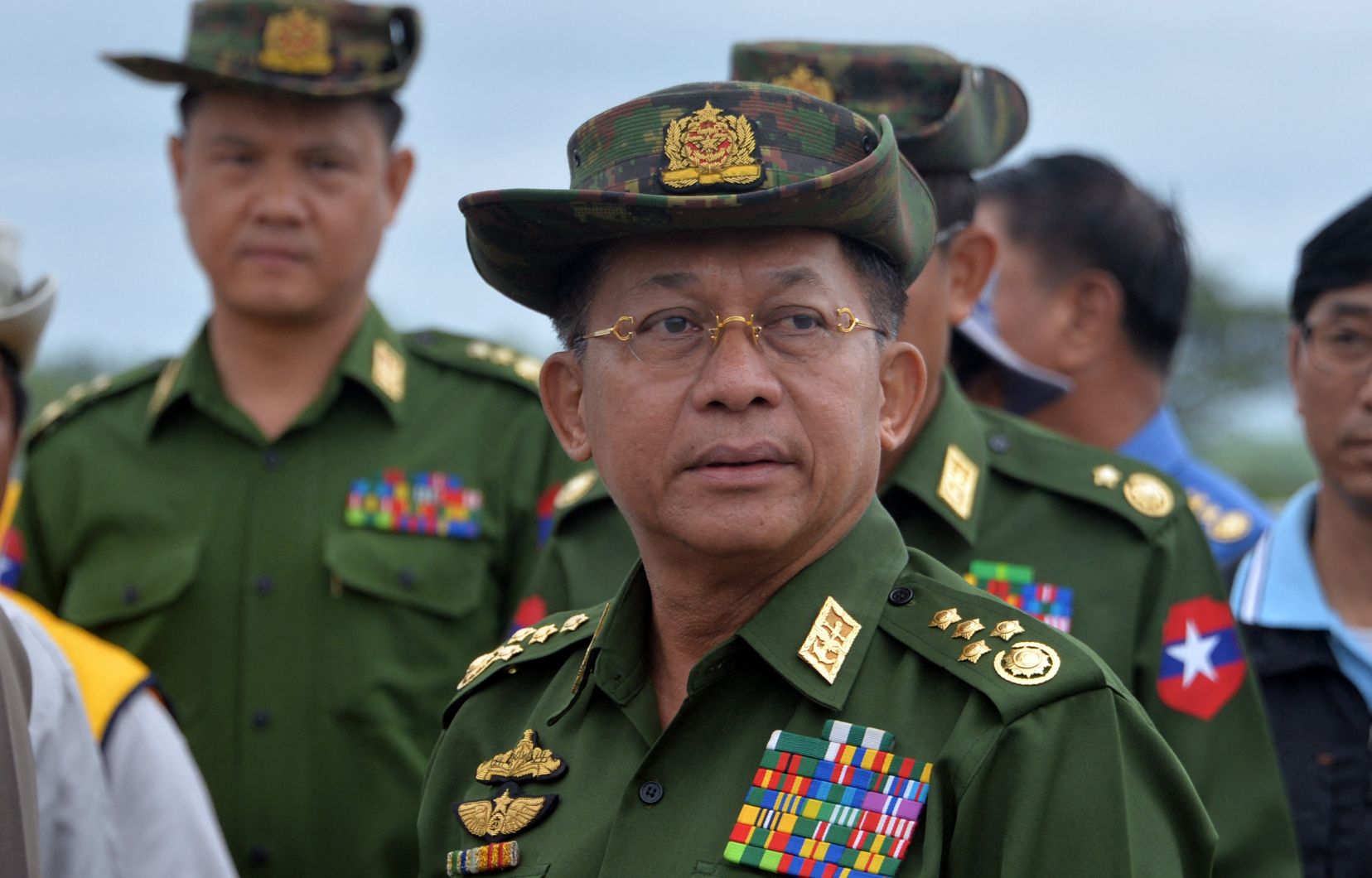Francis Christophe, Asialyst, 3/5/2021
Translated by Fausto Giudice
The West knows this. The Achilles heel of the coup generals in Burma is energy. They are under the financial influence of a complex arrangement for the exploitation of a huge gas field. The whole thing was designed and implemented by Total in partnership with Chevron. France and the United States therefore have a decisive weapon in their hands. While Paris still does not seem to want to use this lever, a bipartisan group in the Senate in Washington has asked Joe Biden to impose sanctions where it hurts the Burmese junta.
Burmese General Min Aung Hlaing, head of the junta that overthrew the civilian government of Aung San Suu Kyi in a coup on January 1, 2021. (Source: Le Devoir)
All parties involved in the Burmese maelstrom discovered on April 28 that a decisive step had been taken in the thirty-year saga of sanctions against the successive juntas in power in Burma. A Reuters dispatch, picked up by some of the international media, announced the suspension of a veritable sword of Damocles over the heads of the February 1 coup generals. The report exposes some of the peculiarities that occurred in the U.S. Senate last week, surprising senior analysts consulted by Asialyst.
Since Donald Trump took office in January 2017 until
April 28, 2021, no bipartisan group had been able to emerge in the Senate, so
deep is the ideological gap separating Republicans and Democrats. However, such
a group has just been formed for the declared purpose of calling at the highest
level of the Biden administration for sanctions explicitly targeting the MOGE
(Myanmar Oil and Gas Enterprise), the main currency pump of the successive
juntas that have been bleeding Burma for 30 years. [Read letter from the Senators to Blinken and Yellen]
The Senate bipartisan group estimates that the annual foreign exchange earnings of the generals from gas exports are $1.1 billion. Until last week, the figure given by the Exctractive Industries Transparency Initiative (EITI) prevailed in the U.S. administration and the mainstream media. According to this international organization, funded by states, UN organizations and private contributors, including Chevron and Total, Chevron would have paid about 50 million dollars between 2014 and 2018. the figures given by the CEO of Total in his April 4 op-ed are of the same order of magnitude.
So far, neither the senators, nor the Biden administration, nor the mainstream media have pointed out the gulf between the actual revenues reaching the generals and the reported payments from Total and Chevron.
Explicitly designating the MOGE conglomerate, the generals' money pump, as a target for a ban on all transactions is a credible threat of quick-fix sanctions. In the extra-territoriality characteristic of U.S. law, an executive order from President Biden targeting MOGE would instantly dry up all financial flows related to Burmese gas exports.
The Total Group, operator of the Yadana offshore gas field, also presides over the Moatama Gas Transport Company, the manager of the pipeline, its compressor stations and its meters, through a subsidiary based in Bermuda. It is, by construction, co-architect of the complex - and unorthodox - financial circuits connected to the MOGE. Partner Chevron has never raised any known objections to these arrangements, which have been well established in 20 years of operation.
A credible threat of sanctions against MOGE, that’s the sword of Damocles hanging over the heads of the coup perpetrators. This would cut off their vital financial lifeline and call into question whether their partners Total and Chevron would be able to stay in Burma at all.The composition in Washington of the Senate group calling for sanctions against MOGE clarifies the threat. The Republican senator from Florida, Marco Rubio, is a member. This Pavlovian anti-Castroist, anti-Chavist, boasts of having, under the Trump administration, blocked foreign currency accounts of PDVSA, the Venezuelan state oil company, and transferred the contents to Juan Guaido, the U.S.-backed opponent of President Nicolas Maduro. In short, a precedent not likely to comfort General Min Aung Hlaing and his clique.
No counter-power in Paris
In Washington, a counter-power to the extractive industries lobby has just emerged in the Senate, supporting “business as usual” among Burmese generals, as elsewhere. Nothing of the sort in Paris. For decades, Total's influence has remained without any counterpart beyond NGOs, rare press articles or little-read books.
A high-ranking French diplomat, called to perform duties covering Southeast Asia, is received by his minister - the scene takes place between the late 1990s and 2015, but would not, according to sources at the Quai d'Orsay, be totally obsolete by 2021. The Minister of Foreign Affairs, after having mentioned a series of files concerning specific points to follow in certain Asian countries, comes to Burma. “Our line in this country can be summed up in three words,” says the minister, “Total, Total, Total.”
Total's influence in France is not limited to privileged access to the highest levels of government and ministries. The Group is also the leading practitioner of corporate sponsorship in France. Those who are not sponsored can hope to become so. The editorial staff of the Nouvel Observateur (now L'Obs) still remember being deprived of advertising from the oil company for five years after publishing an article on the expeditious methods used by the Burmese army to clear the route of the future gas pipeline to Thailand.
The Total network has just occupied an unexpected position in Paris. At the beginning of the year, Paris mayor Anne Hidalgo appointed Paul-David Régnier, a former director of public affairs at Total, to head the city's international affairs department. His appointment, with such a profile, as responsible for the international image of a city governed by a majority including the Greens, did not provoke any public comment. This is also a measure of Total's influence, and the omerta that accompanies it.
No one in Total's management or at the top of the French government has the slightest influence on what the Biden administration will decide - or not decide - against MOGE. By definition, a sword of Damocles destabilizes over time.
 Former
journalist at AFP and Bakchich, former investigator for the Observatoire
Géopolitique des Drogues (Geopolitical Observatory of Drugs), Christophe is an
independent journalist. Author of the book “Birmanie, la dictature du pavot”
(Picquier, 1998), he is passionate about “black holes of information”, Burma being,
from 1962 to 1988, the country that best fits this definition. No information
came out of this autarkic, archaic military dictatorship, warring against its
minorities, proclaiming in the desert its march on the Burmese way to
socialism.
Former
journalist at AFP and Bakchich, former investigator for the Observatoire
Géopolitique des Drogues (Geopolitical Observatory of Drugs), Christophe is an
independent journalist. Author of the book “Birmanie, la dictature du pavot”
(Picquier, 1998), he is passionate about “black holes of information”, Burma being,
from 1962 to 1988, the country that best fits this definition. No information
came out of this autarkic, archaic military dictatorship, warring against its
minorities, proclaiming in the desert its march on the Burmese way to
socialism.



Aucun commentaire:
Enregistrer un commentaire